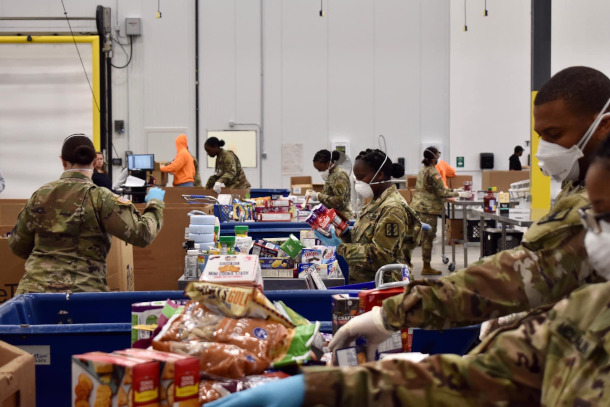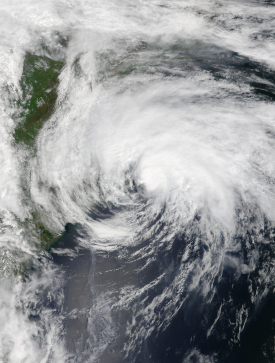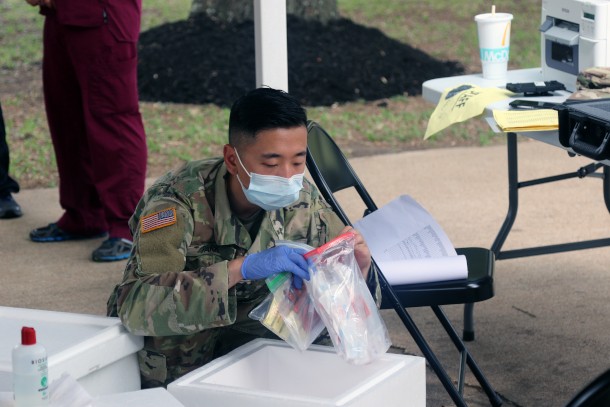Hurricanes and COVID-19
Air Date: Week of May 29, 2020

The Georgia National Guard assists the Atlanta Community Food Bank as part of the US’ Coronavirus response. (Photo: Georgia National Guard, Wikimedia Commons, Public Domain)
2020 is likely to be the warmest on record and the Atlantic hurricane season is predicted to be worse than average with three or more extremely dangerous storms. Should those storms come ashore FEMA, the US agency responsible for disaster recovery and response, is at risk of being overwhelmed as it already has to handle the novel coronavirus pandemic, and a backlog from past storms, wildfires and floods. For more on the intersection between storm response and COVID-19, Host Steve Curwood talks with Rachel Cleetus, Lead Economist and Policy Director for the Climate and Energy Program at the Union of Concerned Scientists.
Transcript
CURWOOD: From PRX and the Jennifer and Ted Stanley Studios at the University of Massachusetts Boston, this is Living on Earth. I’m Steve Curwood.
The Federal Emergency Management Agency or FEMA has been stretched thin by the corona virus pandemic and a backlog from previous disasters including Hurricanes Harvey and Maria. The National Oceanic and Atmospheric Administration predicts 2020 will have more hurricanes than average, with three or more extremely dangerous storms. Some experts say that with the pandemic FEMA is in no shape to handle these storms if they come ashore. And research finds the number of major storms is increasing as the planet warms, with 2020 likely to be the warmest year on record. Already before the June first start of the 2020 hurricane season tropical storms Arthur and Bertha formed, and Bertha battered the Carolinas. For more on the intersection of COVID-19 and hurricanes, we’re joined by Rachel Cleetus, lead Economist and Policy Director for the Climate and Energy Program at the Union of Concerned Scientists. Rachel, welcome back to Living on Earth!
CLEETUS: Hi, Steve, thank you for having me.
CURWOOD: So, the Atlantic hurricane season officially begins June 1st. But scientists are saying that the 2020 season is already on track to be worse than the average season. Why is that?
CLEETUS: So, what that means is that there's going to be a likely range of six-to-ten hurricanes, with three-to-six of them being major hurricanes; that means Category Three or above, expected this year. And these kinds of hurricanes are the ones that, if they make landfall, cause really catastrophic impacts. They have high winds, they're carrying a lot of precipitation. The other challenges that we've seen in recent years, these hurricanes also intensify faster compared to historical records. That means that we're seeing very, very powerful storms form quickly, meaning that people have less window to evacuate when these really major storms are turning up. And this year, we see many of the ingredients for a very active hurricane season: sea surface temperatures in the Atlantic and the Caribbean Sea are high, we don't have an El Nino this year to interfere with the formation of these storms. So, we're likely to see an above-average hurricane season, and the sobering reality is this year the hurricane season is going to collide with the COVID-19 pandemic, compounding the risks to people all along the Gulf and East Coast of the US.
CURWOOD: Of course, there's the immediate threat to human life and property. And then there's a question of, of the economy and, and how these areas, how folks recover. Describe for me some of the compound risks from these kinds of events.

Tropical Storm Arthur on May 18th, 2020. 2020 is the sixth consecutive year where a tropical storm has formed before the official start to the hurricane season, which is June 1st. (Photo: NASA, Wikimedia Commons, Public Domain)
CLEETUS: What we're seeing this year is that these climate hazards, which are increasing in frequency and intensity under climate change are likely to intersect with COVID-19 outbreaks, both here in the US and around the world. And these compound risks will exacerbate and be exacerbated by the unfolding economic crisis as well. As well as long standing social and racial disparities. So here in the US, for example, we're seeing African American people die at three times the rate as white people under this COVID-19 epidemic. The unemployment in the US has surged past 38 million, and the unemployment rate is much higher for communities of color. And this makes it even more complicated when a disaster strikes, because people are already going into this hurricane season under siege from both economic and COVID-19 crises. And a disaster like a hurricane will only exacerbate the impact on people.
CURWOOD: Well, we're seeing that it's challenging to maintain what we call social distancing and wearing masks. And yet if we don't follow that kind of advice when something like a hurricane or a pandemic or both come at the same time, what kind of trouble do you think we're in?
CLEETUS: Look, even under regular circumstances evacuating, and sheltering in anticipation of a hurricane is very challenging. It's really hard for people to make that decision to leave their home, to go somewhere else. And yet, this year, it's going to be even more important that people heed these warnings well in advance, they're going to need to find out where they can go and how to go there safely during this COVID-19 pandemic. They're going to have to make sure that they're carrying supplies with them, including face masks, hand sanitizers and other kinds of public health precautions. They're going to need to maintain social distancing. It's going to be very challenging for state and local authorities as well, because they have to figure out how to shelter people, how to get people out of harm's way, while maintaining social distancing. Especially those populations who might be vulnerable like people in nursing homes, the elderly, others may not be able to afford actuate by themselves or may not have transportation, may not have the resources to evacuate. We're going to need an extraordinary effort from state, local, and federal authorities to keep people safe this hurricane season, even in the midst of a COVID-19 pandemic.

A solider with the Texas National Guard processes sample bags with COVID-19 tests as part of FEMA’s Coronavirus response. (Photo: Texas National Guard, Flickr, CC BY 2,0)
CURWOOD: The Federal Emergency Management Agency, FEMA, is the part of the federal government that is tasked with leading hurricane response and recovery efforts. But last I looked, they're also handling some other disasters, chiefly the novel Coronavirus response. Some suggests that FEMA is going to be stretched too thin. How accurate would you say that statement is?
CLEETUS: There's no question that FEMA has already stretched thin as we go into this hurricane season. So FEMA is coordinating our nation's response to the COVID-19 crisis. It's the nation's lead disaster response agency as well. So, it will be responsible for other kinds of disasters like hurricanes, wildfires. We've already seen it have to deploy for flooding this year in the Midwest. And so, we have an agency that is now responding to 57 disaster declarations. We have a nationwide disaster declaration in every single state, five territories, in tribal communities as well. And FEMA is coordinating all those responses. So, now when you imagine a hurricane season on top of that, you can see an agency that's going to be very, very stretched. We have still not recovered from past disasters, previous hurricane seasons, like the extraordinary 2017 and 2018 hurricane seasons. And that means that FEMA is still trying to help communities recover from those past disasters, even ahead of this year. FEMA is certainly recognizing that the COVID-19 pandemic is going to have a significant impact on its operations. And they want to shift as far as possible to remote operations, especially in places where there is a COVID-19 outbreak. And I just want to remind your listeners, the hurricane season stretches all the way through November 30. And public health experts are telling us that we will very likely see another wave of COVID-19 outbreaks around the country later this summer, early in fall. So how does an agency coordinate its disaster response which really requires engaging with people, making sure people are evacuated safely, making sure that they're sheltering safely. These are not things that can be done remotely. There are some pieces of this that can be done, but the reality is, we do need federal, state, and local authorities to help people get out of the way and stay safe.
CURWOOD: Sounds to me that there're gonna be many people, if and when a major hurricane strikes, they're gonna be more or less on their own.
CLEETUS: There will hopefully be very clear guidance and communications from federal, state, and local authorities telling people when a major hurricane or other type of disaster is likely to come so that they can get out of the way, in time, safely. But, yes, unfortunately, a lot of the responsibility does fall to individuals to make those decisions and to make them in time. So what's really important right now is if you are in one of these places that is hurricane prone, please make sure that you have prepared well in advance that you have the supplies that you would need, that you know where you would likely go, if such an event were to happen, and that you know where to get the best and most updated information to help you stay prepared.

Rachel Cleetus is the Lead Economist and Policy Director for Climate and Energy at the Union of Concerned Scientists. (Photo: Courtesy of Rachel Cleetus)
CURWOOD: So, what role does Congress play in all this, when it comes to America?
CLEETUS: Well, this year we've seen as part of the CARES Act, there was an increased allocation, $45 billion for FEMA Disaster Relief Fund, $25 billion of which is to be allocated for major disasters. Going into this hurricane season, FEMA does have this funding, but it can quickly dissipate if we do have major landfalling hurricanes, so Congress does need to stand at the ready to help the agency should there be a number of disasters. Because of course, this money is not just about hurricanes. It's also helping with the COVID-19 pandemic, with wildfires, with flooding, inland flooding, with droughts. This is for disasters across the board.
CURWOOD: Rachel Cleetus is the Climate and Energy Policy Director at the Union of Concerned Scientists. Thanks so much for taking the time with us today, Rachel.
CLEETUS: Steve, thank you for having me.
Links
NOAA 2020 Hurricane Season Predictions
Living on Earth wants to hear from you!
Living on Earth
62 Calef Highway, Suite 212
Lee, NH 03861
Telephone: 617-287-4121
E-mail: comments@loe.org
Newsletter [Click here]
Donate to Living on Earth!
Living on Earth is an independent media program and relies entirely on contributions from listeners and institutions supporting public service. Please donate now to preserve an independent environmental voice.
NewsletterLiving on Earth offers a weekly delivery of the show's rundown to your mailbox. Sign up for our newsletter today!
 Sailors For The Sea: Be the change you want to sea.
Sailors For The Sea: Be the change you want to sea.
 The Grantham Foundation for the Protection of the Environment: Committed to protecting and improving the health of the global environment.
The Grantham Foundation for the Protection of the Environment: Committed to protecting and improving the health of the global environment.
 Contribute to Living on Earth and receive, as our gift to you, an archival print of one of Mark Seth Lender's extraordinary wildlife photographs. Follow the link to see Mark's current collection of photographs.
Contribute to Living on Earth and receive, as our gift to you, an archival print of one of Mark Seth Lender's extraordinary wildlife photographs. Follow the link to see Mark's current collection of photographs.
 Buy a signed copy of Mark Seth Lender's book Smeagull the Seagull & support Living on Earth
Buy a signed copy of Mark Seth Lender's book Smeagull the Seagull & support Living on Earth

